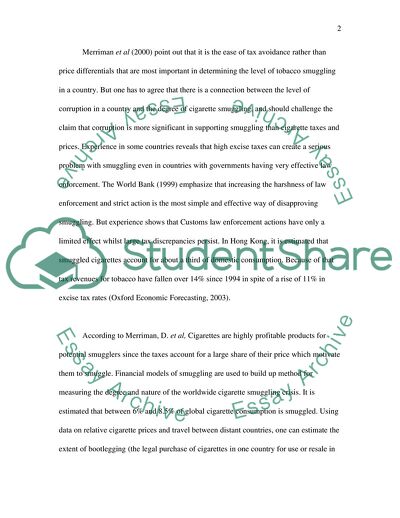
- Home
- Free Samples
- Premium Essays
- Editing Services
- Extra Tools
- Essay Writing Help
- About Us
- Studentshare
- Subjects
- Miscellaneous
- Tobacco tax in Hong Kong: How Does It Influence Cigarette Consumptions and Social Welfare
Tobacco tax in Hong Kong: How Does It Influence Cigarette Consumptions and Social Welfare - Essay Example

- Subject: Miscellaneous
- Type: Essay
- Level: Masters
- Pages: 4 (1000 words)
- Downloads: 0
- Author: leannaeffertz
Extract of sample "Tobacco tax in Hong Kong: How Does It Influence Cigarette Consumptions and Social Welfare"
couraging this unlawful activity (smuggling), higher taxes would weaken the quality of products entering the market; promote a culture of tax avoidance and crime; discourage investment in developing markets by global companies; and weaken the tax base. The World Bank (1999) points out that higher taxation on tobacco products would tend to a major reduction in cigarette consumption, particularly in middle and low-income groups and in turn increase government tax revenues. But the research of ITIC reveals that, although higher taxes may have an important impact on genuine tobacco sales, its impact on overall consumption is likely to be moderate because of the rise in purchases of smuggled cigarettes.
Smuggling also weakens the tax base and reduces government revenues. High taxes may also cause consumers to switchover to cheaper cigarettes, which also reduce government revenues. Merriman et al (2000) point out that it is the ease of tax avoidance rather than price differentials that are most important in determining the level of tobacco smuggling in a country. But one has to agree that there is a connection between the level of corruption in a country and the degree of cigarette smuggling, and should challenge the claim that corruption is more significant in supporting smuggling than cigarette taxes and prices.
Experience in some countries reveals that high excise taxes can create a serious problem with smuggling even in countries with governments having very effective law enforcement. The World Bank (1999) emphasize that increasing the harshness of law enforcement and strict action is the most simple and effective way of disapproving smuggling. But experience shows that Customs law enforcement actions have only a limited effect whilst large tax discrepancies persist. In Hong Kong, it is estimated that smuggled cigarettes account for about a third of domestic consumption.
Because of that tax revenues for tobacco have fallen over 14% since 1994 in spite of a rise of
...Download file to see next pages Read MoreCHECK THESE SAMPLES OF Tobacco tax in Hong Kong: How Does It Influence Cigarette Consumptions and Social Welfare
The Best Way to Prevent Smoking
The causes and impact of unemployment in the United Kingdom
Social Work Intervention On Parents Who Are Drug Users
Legalizing Cannabis
Hong Kong Environmental Regulations
Cigarette Tax: Distribution of Tax Burden or the Incidence of Taxation
Externality as a Big Concept in Economic Analyses
Is Marijuana a Dangerous Drug

- TERMS & CONDITIONS
- PRIVACY POLICY
- COOKIES POLICY